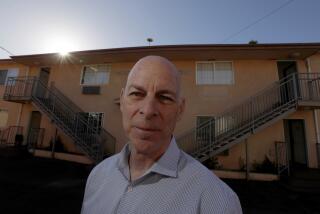Settlement of Suits Causes Slow-Growth Group Schism
Founders of Orange County’s leading slow-growth organization say two lawyer-members of their group have made key decisions about settling anti-development lawsuits and the amounts of legal fees to be collected without consulting them. The lawyers, they say, have collected more than $80,000 in attorney’s fees from the settlements.
Russ Burkett, co-founder of Citizens for Sensible Growth and Traffic Control, said Thursday that attorneys Greg Hile and Belinda Blacketer made the decisions without consulting either him or Tom Rogers, the group’s chairman.
Burkett also said that Hile, the committee’s campaign treasurer, failed to disclose $10,000 in payments from Citizens for Sensible Growth to the Laguna Beach law firm of Hile & Blacketer in a mandatory campaign report filed Friday with the county registrar of voters.
On Tuesday, a disgruntled Rogers said, “I’m just sick over what transpired.”
But Rogers declined to elaborate, saying, “I don’t want to air our dirty linen in public.”
Hile was out of town Thursday and could not be reached for comment. Blacketer said the amount omitted from the campaign report was more like $5,000, which had been received for defending the initiative against pre-election court challenges by the Building Industry Assn. of Southern California.
Blacketer said the omission was “merely an oversight that will be corrected.”
As for the settlements of anti-development lawsuits filed by Citizens for Sensible Growth, Blacketer said they were handled properly. She said nothing remained for the debt-ridden slow-growth organization after legal fees were collected because that’s all she and Hile were able to obtain from the developers involved in the settlements.
Blacketer and Hile are board members of Citizens for Sensible Growth and Traffic Control.
Norm Grossman, also a board member, agreed with Blacketer that the settlements and the legal fees were appropriate. He attributed the divisiveness within the ranks to misunderstandings, lack of communication and personality conflicts that have intensified since Measure A was defeated in a countywide vote June 7.
Since the beginning of the year, Hile and Blacketer have filed a total of 11 lawsuits on behalf of Citizens for Sensible Growth and Traffic Control in an effort to nullify pre-election zoning agreements between developers and the Orange County Board of Supervisors. Slow-growth activists claimed that the agreements were unconstitutional and were aimed chiefly at circumventing Measure A on the June ballot. Several similar lawsuits have been filed on behalf of other environmental groups.
Generally, the lawsuits targeted planned developments such as Bear Brand, Marina Hills, Laguna Laurel, Dove Canyon, Baker Ranch, the Irvine Coast, Rancho Santa Margarita and Aliso Viejo. All told, the developments involve more than 60,000 planned housing units.
After the June election there was a meeting at which board members of Citizens for Sensible Growth and Traffic Control discussed how to proceed with their lawsuits.
“It was always understood that that we were going to settle the smaller lawsuits in an effort to consolidate everything for the one or two big cases,” Grossman said. “I assumed that was what everyone knew.”
Burkett said Thursday that his main concern was what had happened to the settlement money. But Grossman said he was satisfied that Hile and Blacketer had earned it through their legal representation of the organization.
Burkett said Citizens for Sensible Growth and Traffic Control considered hiring other law firms that were unassociated with the organization when the board first decided to file a series of lawsuits. But he said Hile and Blacketer insisted they could handle the cases for less money.
Blacketer said Burkett and Rogers were informed at the post-election meeting of the possibility that all the money from the settlements would be eaten up by attorney’s fees and she said they nonetheless had expressed eagerness to get the lawsuits out of the way. Blacketer said it is customary for lawyers to collect legal fees directly from settlements rather than giving the money to clients first and then billing them.
Blacketer and Hile have settled nine of the 11 lawsuits in which Citizens for Sensible Growth and Traffic Control is a plaintiff or co-plaintiff.
Three other environmental groups are plaintiffs individually or jointly in four other lawsuits.
Slow-growth activists insisted Thursday that lawsuits challenging the Aliso Viejo, Irvine Coast and Laguna Laurel developments will continue and that they have ample financial resources to see them through, partly because those cases have multiple plaintiffs.
But Blacketer said Thursday that money from previous settlements, collected as legal fees, will not be used to pay for that litigation.
She also acknowledged that, except for a park boundary change involving the Rancho Santa Margarita lawsuit, no concessions have been obtained from developers in the settlements.
She said board members of Citizens for Sensible Growth and Traffic Control were told in June that an effort would be made to get developers to let a new county growth management program apply to their projects. None has agreed to do so, Blacketer said.
Blacketer said the amounts received in the settlements have ranged from $7,500 to $10,000 each, with one exception. That was the Rancho Santa Margarita case, which was settled Wednesday for $17,400. She said each of the settled lawsuits has involved an average of about 95 hours of legal work by her and Hile. Their fee for that work is $125 an hour, she said.
In another development Thursday, Huntington Beach slow-growth activist Tom Harman said he was resigning from the board of the countywide group but not because of the lawsuit settlements. Harman said he quit the countywide board because he had missed all of its meetings and felt he was an “odd man out” because all the other members are from the south county.
More to Read
Inside the business of entertainment
The Wide Shot brings you news, analysis and insights on everything from streaming wars to production — and what it all means for the future.
You may occasionally receive promotional content from the Los Angeles Times.










